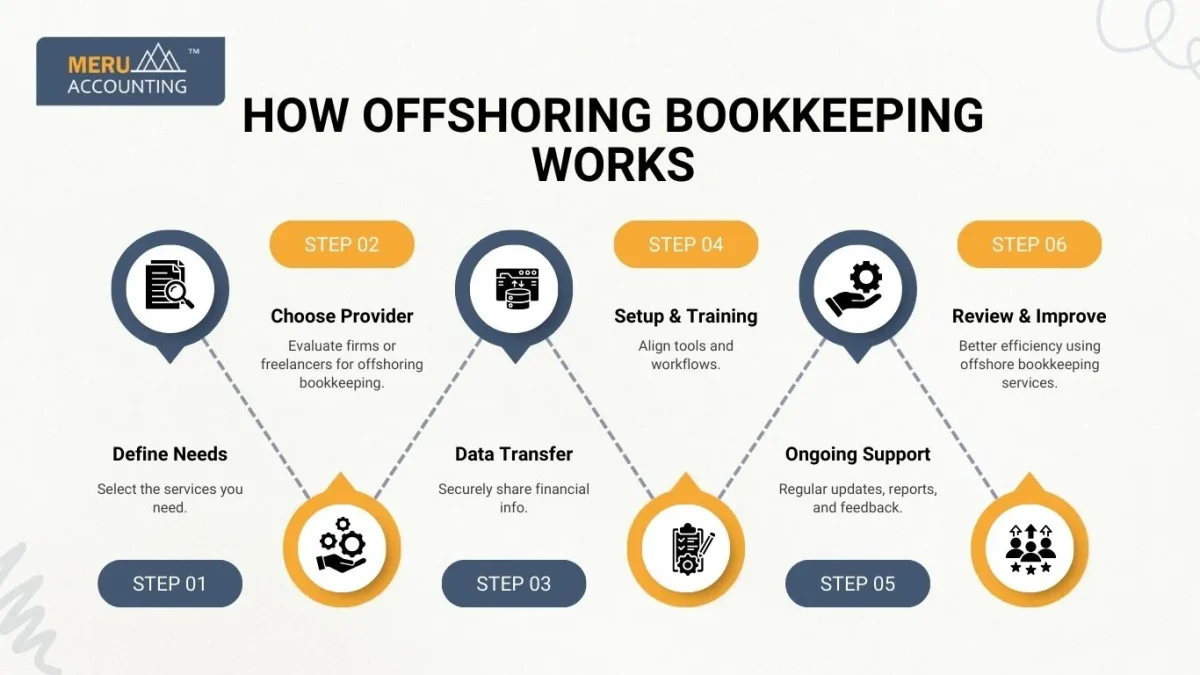Outsource vs Offshoring Bookkeeping: Understanding Offshore Bookkeeping Services
Outsourcing bookkeeping helps businesses save time and cut costs. It lets them focus on their main work. Offshoring bookkeeping or offshore bookkeeping services gives expert help at a lower price. This guide explains these ideas in simple points with a natural use of keywords.
Outsourcing means a business hires a third party to do some work. This third party is not part of the business. For example, a company may hire an outside accountant or accounting firm to handle its books. Outsourcing can happen in the same country or in a different one.
Offshoring is when a business sets up its own office or team in another country. This helps the business get benefits like lower costs and more workers. For example, a U.S. company may start a unit in a developing country. The offshore team works only for that company, unlike outsourcing.
Why Is Offshoring Increasing Nowadays?
Many factors drive businesses to choose offshoring. Here are some key reasons:
Cost-effectiveness
Running some tasks in the home country can be very costly. Offshoring to another country can save money. Many companies pick developing nations because they offer lower costs.
Skilled manpower in developing nations
Countries like India have many skilled workers. These workers are often cheaper but still very capable. This helps companies get good work without paying too much. Many businesses choose offshoring bookkeeping to reduce costs while maintaining quality, especially by using skilled professionals in developing nations.
Better connectivity technology
Tools like Skype and Google Duo make it easy to stay in touch across countries. This helps businesses watch and manage their offshore teams without trouble.
Cloud bookkeeping software
Cloud bookkeeping software plays a key role in managing offshore bookkeeping services efficiently, allowing companies to access data anytime, anywhere. Software like QuickBooks and Xero lets companies see their financial data anytime, anywhere. This makes offshoring easier and faster to handle.
Social behavior
Different countries bring unique skills and ways of thinking. This variety can help a business improve its work and output.
Use of Software
Apps like Asana and Karbon HQ help businesses track work and progress, no matter where their teams are.
Mobile technology and fast data
With 4G and soon 5G, it is simple to connect with offices far away. Fast mobile data removes limits and makes offshoring smooth.
Real-time accounting
Advanced tools let firms watch their accounting work as it happens. Software like Xero and QuickBooks helps companies access data in real-time.
Increase in e-contracts
Big paper contracts are now less needed. Digital contracts are easy to sign and share by email. This speeds up agreements for offshore work.
Accounting is becoming a commodity
New tech has made accounting faster and more automatic. This change helps companies save money and time.
Global laws vary
Some countries have laws that favor business more than others. Companies often pick places with easier rules to get a business edge.
Accounting as a reporting tool
Accounting is not just about keeping books anymore. It is now used to make key business decisions and drive growth.
Services Commonly Outsourced
Offshore bookkeeping services cover many essential tasks, from data entry to financial reporting, helping businesses streamline their operations.
Bookkeeping & Data Entry
Bookkeeping and data entry help maintain clear financial records.
This service tracks income and expenses on a daily basis. Many companies rely on offshore bookkeeping services for accurate and cost-effective record-keeping.
Accounts Payable / Receivable
This service takes care of vendor payments and customer collections.
It keeps your cash flow steady and avoids late payments.
Bank Reconciliation
Bank reconciliation matches your books with bank statements.
It helps catch errors, missing entries, or unusual activity.
Payroll Services
Payroll services handle staff wages, taxes, and deductions.
They make sure everyone is paid the correct amount on time.
Financial Reporting
Financial reporting includes monthly and quarterly reports.
These reports show how your business is doing over time.
Tax Preparation
Tax preparation means filing taxes with the proper agencies.
It helps you stay legal and avoid extra charges or audits.
Budgeting & Forecasting
Budgeting and forecasting help plan income and expenses.
This service supports good planning and better decisions.
Offshore bookkeeping services often cover all these, tailored to your business.
How Offshoring Bookkeeping Works
Step | Process |
1 | Define Needs: Select the services you need. |
2 | Choose Provider: Evaluate firms or freelancers for offshoring bookkeeping. |
3 | Data Transfer: Securely share financial info. |
4 | Setup & Training: Align tools and workflows. |
5 | Ongoing Support: Regular updates, reports, and feedback. |
6 | Review & Improve: Better efficiency using offshore bookkeeping services. |

Choosing the Right Offshore Bookkeeping Partner
- Proven experience and skill.
- Strong security and compliance rules.
- Staffing that can grow or shrink with you.
- Clear and fair pricing for offshoring bookkeeping.
- Support and talk in your time zone.
- Good project management to keep work on track.
- A partner who fits your culture and knows your business.
Tools & Technologies Commonly Used
- Cloud accounting tools like QuickBooks Online, Xero, and Zoho Books.
- File-sharing tools such as Dropbox and Google Drive.
- Chat and call tools like Slack and Zoom.
- Security tools like VPNs, encryption, and two-step login.
- These tools help offshore bookkeeping work fast and safely.
- Automation tools to cut down manual work and mistakes.
- Time tracking software to check hours and work done.
Cost Savings with Offshoring Bookkeeping
- Labor costs are often 50 to 70% lower in other countries.
- No costs for hiring or office space.
- Pay only for hours actually worked.
- Use a 24-hour work cycle to close books faster.
- Cut training costs with skilled offshore teams.
- Lower tech costs by sharing cloud tools.
Growth & Business Focus
- Spend more time on sales, marketing, or product work.
- See your money better to make smart decisions.
- Get fast updates from regular reports.
- Add bookkeeping help as your firm grows.
- Offshore bookkeeping lets you focus on what matters most.
- Free your leaders to plan and grow the business.
- Change your support level fast to fit your needs.
Common Concerns & Solutions
- Quality: Test with trial work and check references.
- Talk: Use daily updates and clear ways to chat.
- Security: Sign NDAs, use safe tools, and back up data.
- Time zones: Pick partners with shared hours or shifts.
- Data privacy: Make sure partners follow all laws.
- Backup: Have plans ready if problems come up.
Real Business Use Cases
- A small shop cut bookkeeping costs by 60%.
- A startup hired offshore to free leaders for growth.
- A mid-size firm improved reports and kept up with rules.
- A charity got help from certified accountants at a low cost.
- A fast-growing agency made fewer errors and sped up billing.
- A factory gained better cash flow with timely offshore reports.
Outsourcing bookkeeping through offshore bookkeeping services helps save costs, gain expert help, and stay flexible. When done right, it not only cuts costs but also helps the business grow. Clear steps, strong data safety, and open talk are key to getting the most from offshore bookkeeping. Start with a small task, check the results, and grow with time.
By picking the right service and using the right steps, you get steady help with your books at a lower cost. You also free up time to grow your business. Meru Accounting offers trusted offshore bookkeeping with skilled staff and proven methods. With our services, firms get clear, on-time reports and full help, no matter the task or size of the job.
FAQs
- What is offshoring bookkeeping?
It means hiring skilled bookkeepers in another country to cut costs and grow your team. - Are offshore bookkeeping services secure?
Yes, when they use strong tools like data locks, two-step login, and legal safety rules. - How much can I save?
Most firms save 50% or more when compared to hiring local staff. - How do I talk with offshore teams?
Use Zoom, Slack, or email with clear plans and weekly talks. - Can I scale up or down with ease?
Yes, you can grow or shrink your team based on your workload. - Will time zones cause issues?
Not often. Most offshore teams work in shifts that match your hours. - Can offshore teams follow local tax rules?
Yes, most firms train their staff in your country’s tax laws and rules.








